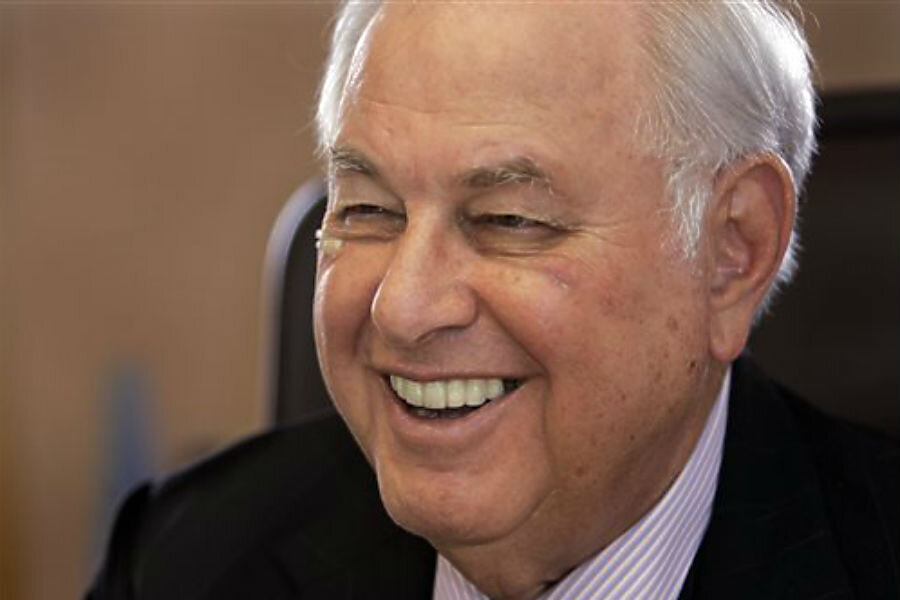A. Alfred Taubman: Shopping plaza billionaire, philanthropist, convicted criminal
Loading...
| Bloomfield Hills, Mich.
A. Alfred Taubman, the self-made Michigan billionaire whose philanthropy and business success — including weaving the enclosed shopping mall into American culture — was clouded by a criminal conviction late in his career, has died. He was 91.
Taubman, who donated hundreds of millions of dollars to universities, hospitals and museums, died Friday night at his home, according to son Robert S. Taubman, president and CEO of Taubman Centers, Inc.
"This company and all that you stand for were among the greatest joys of his life," Robert S. Taubman wrote in a message to the company's employees. "He was so proud of what this wonderful company he founded 65 years ago has accomplished."
Taubman's business success spanned from real estate and art houses to the hot dog-serving A&W restaurant chain, for which he traveled to Hungary to figure out why the country's sausage was so good. He also became a major backer of stem-cell research.
But it was his rearrangement of how people shop — parking lot in front, several stores in one stop close to home — that left a mark on American culture. Taubman Centers, a subsidiary of his Taubman Co., founded in 1950, currently owns and manages 19 regional shopping centers nationwide.
"Everything that excited me that I got interested in, I did," Taubman told The Associated Press in a 2007 interview.
Born Jan. 31, 1924, in Pontiac, Michigan, to German-Jewish immigrants, Taubman worked as a boy at a department store after school near his family's home, which was among the custom houses and commercial buildings developed in the area by his father.
He was a freshman at the University of Michigan when he left to serve in World War II, around the time he stopped using his first name, Adolph. When he returned to Ann Arbor to study art and architecture, he created small on-campus businesses to cover expenses, then transferred to Lawrence Technological University near Detroit to take night classes while working at an architectural firm as a junior draftsman.
Recognizing the booming post-war growth of the middle class, particularly in the Motor City, he launched his first real estate development company in 1950. His first project was a freestanding bridal shop in Detroit — but he had his eyes on something bigger. He'd noticed shoppers responding to the convenience of "one-stop comparison shopping opportunity," he wrote in his autobiography.
So when a friend suggested a shopping plaza in Flint, Taubman's company did something radical for the time: stores were pushed to the back of the lot and parking spaces were put up front. It was a success, his young company took on larger-scale developments in Michigan, California and elsewhere in the 1950s and early '60s.
Taubman served as chairman of Sotheby's Holdings, Inc., parent company of Sotheby's art auction house, from 1983 to 2000, and was a partner in international real estate firm The Athena Group before he was tangled in a price-fixing scheme. He was convicted in 2001 of conspiring with Anthony Tennant, former chairman of Christie's International, to fix the commissions the auction giants charged. Prosecutors alleged sellers were bilked of as much as $400 million in commissions.
Taubman was fined $7.5 million and spent about a year in a low-security prison in Rochester, Minnesota, but long insisted he was innocent and expressed regret for not testifying in his own defense.
"I had lost a chunk of my life, my good name and around 27 pounds," he recalled in his book, saying he was forced to take the fall for others.
The case cast a shadow over Taubman's accomplishments, but it diminished over the years — and his philanthropy continued unabated. He had pledged $100 million to the University of Michigan's A. Alfred Taubman Medical Research Institute and its stem-cell research by 2011. He also financed public-policy programs at Harvard, Brown University and the University of Michigan, which received several large donations.
He donated millions and spoke passionately in support of the 2008 ballot initiative in Michigan that eased restrictions on embryonic stem-cell research and enabled his namesake institute to conduct major research for diseases — including amyotrophic lateral sclerosis, or Lou Gehrig's disease, which claimed the life of his good friend, New York Sen. Jacob Javits, in 1986.
After turning over control of Taubman Centers to his two sons, Taubman made sustaining the Detroit Institute of Art a priority. His knowledge of how shoppers negotiated malls was tapped to help reconfigure the flow of the museum, and he helped guide the DIA as president of the Detroit Arts Commission through chronic financial problems.





